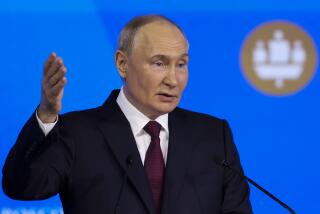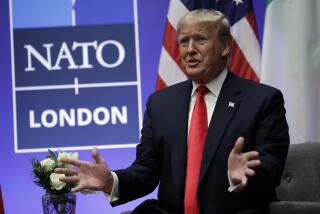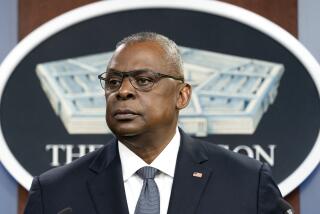Bush Hints at Broadening War
- Share via
WASHINGTON — President Bush held out the possibility Tuesday that the war on terrorism could lead U.S. military forces to targets beyond Afghanistan.
Although Bush administration officials have repeatedly said they are keeping all options open in their avowed worldwide war on terrorism, the president’s remarks about sending troops to more countries come as success in Afghanistan appears likely and there is an increasing focus on where to go next.
Officials at a variety of U.S. government agencies, including the Pentagon and the State Department, are drafting post-Afghanistan strategies for rooting out terrorism. National security aides are conducting a widely publicized debate over whether U.S. military force should next be directed at Iraq.
“There may be need to use military troops elsewhere,” the president said. “I just want the American people to know that we’re keeping all options on the table.”
The president made the comments in an interview recorded at the White House that will be broadcast tonight on ABC News’ “20/20.”
Bush’s remarks came amid seemingly rapid progress in the current phase of the war in Afghanistan and after warnings to Iraq’s Saddam Hussein last week.
Without making a specific threat, Bush said the Iraqi president must let United Nations weapons inspectors back into Iraq. The “or else” was unstated but clearly implied.
On Tuesday, he suggested that the United States’ progress in Afghanistan--and he left no doubt that he was certain the mission there would succeed--might even change Hussein’s opposition to inspections.
“It may just be that countries say, ‘Well, gosh, there’s a full intent of the coalition to hold us accountable for harboring terrorists and/or developing weapons of mass destruction which could be used by terrorists,’ ” he said, adding: “They may say, ‘Please . . . come in.’ ”
Does that mean, asked interviewer Barbara Walters, that Iraq may say “please come”?
The president replied: “Could very well be. We don’t know yet.”
But, Bush said, the fight in Afghanistan is far from over.
The president emphasized that not every military mission will be obvious--and not every strike against terrorism will have a military component.
“This war on terror is so unconventional that there will be strikes that people may not see until we tell them that there’s been a strike,” the president said.
Shortly after the interview, Bush announced that the United States was freezing the assets of three organizations tied to Middle East terrorism to restrict their activities not by military means but by cutting off the funding that passes through the U.S. banking system.
More than a dozen possible target countries beyond Afghanistan have been mentioned, including Iraq, Colombia and North Korea.
Considered among the most probable next targets are some of the weaker and poorer countries in Asia and Africa where Osama bin Laden’s Al Qaeda and other terrorist groups have set up shop.
U.S. forces could move readily into Somalia to strike terrorist camps. The country has a weak government, and neighboring Ethiopia has been willing to accept training and aid to help in this effort.
Some defense officials advocate action against terrorists in Yemen, Sudan and Libya, though the governments of all three have taken steps to move away from support of terrorists.
Within the U.S. government there are also advocates for a stepped-up anti-terrorist effort in Colombia, where the government is fighting various rebel groups. But that fight could become a quagmire, and the insurgents aren’t linked to Al Qaeda, which is the prime U.S. terrorist target.
More to Read
Get the L.A. Times Politics newsletter
Deeply reported insights into legislation, politics and policy from Sacramento, Washington and beyond. In your inbox twice per week.
You may occasionally receive promotional content from the Los Angeles Times.










